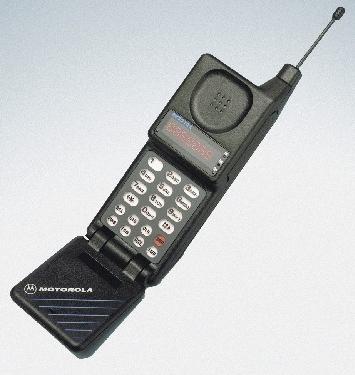 Advances in technology brought about the revolutionary Motorola MicroTAC phone of 1989 - the first step towards smaller mobile phones.
Advances in technology brought about the revolutionary Motorola MicroTAC phone of 1989 - the first step towards smaller mobile phones.It was also massively influential, being the world's very first flip phone. The aerial, by the way, was simply ornament!
It really was incredible as, at that time, mobiles were like grandiose walkie-talkies. And you had to be a yuppie (or Del Boy Trotter) to afford one.
The decade which introduced the very first hand-held mobile, the DynaTAC 8000x in 1983, very much a brick, roared towards its end with this little beauty.
Of course it was analogue, but the current system was on its way, and had been since 1982 when Groupe Spécial Mobil (GSM) was formed to design a pan-European mobile technology.
Behind the scenes planning often long pre-dates technology hitting the streets, and in that light it's amusing to relect that there were no hand-held mobile phones in 1982, and that the Mobira Senator, Nokia's very first mobile phone - a car phone released in 1982, weighed around twenty one pounds!
From 1982-1984, agreement on strategic targets for GSM was reached.
From 1985-1987, agreement on principles for services, network architecture, radio and speech coding in GSM was reached.
In 1986, trials of different digital radio transmission schemes and different speech codecs were carried out in several countries and comparative evaluations carried out by GSM.
1987 was the birth year of the current system, with GSM agreeing its basic parameters. This was finalised in May 1987 in Bonn. Then, in September 1987, a proposal was put forward to create an operator agreement in the form of a ‘Memorandum of Understanding’. This was drawn up and signed in Copenhagen in September by fifteen members from thirteen countries that committed to deploying GSM.
The BBC reported in 2007:
The technology behind the mobile phone is celebrating its 20th anniversary.
On 7 September 1987, 15 phone firms signed an agreement to build mobile networks based on the Global System for Mobile (GSM) Communications.
According to the GSM Association there are more than 2.5 billion accounts that use this mobile phone technology.
Adoption of the technology shows no signs of slowing down with many developing nations becoming keen users of mobile handsets.
Robert Conway, head of the GSM Association, said the memorandum of understanding signed in 1987 is widely seen as the moment when the global mobile industry got under way.
Although work on the GSM technical specifications began earlier (1982), the agreement signed in 1987 committed those operators to building networks based upon it.














